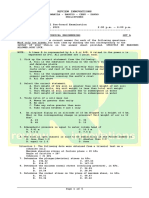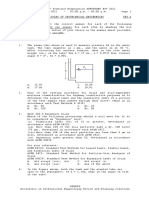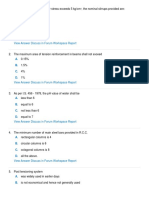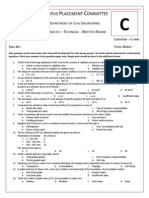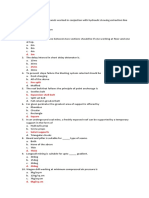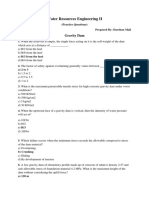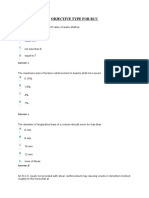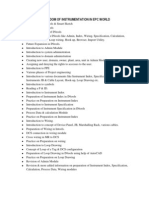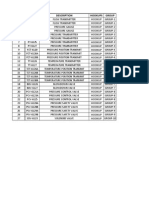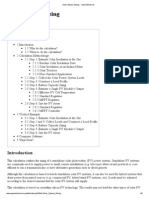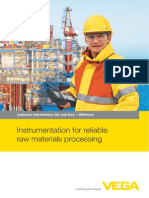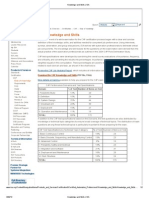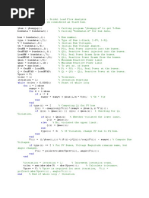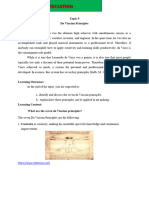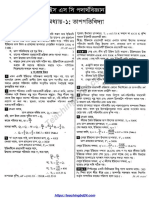Civil Question Paper
Civil Question Paper
Uploaded by
amarnethaCopyright:
Available Formats
Civil Question Paper
Civil Question Paper
Uploaded by
amarnethaOriginal Description:
Copyright
Available Formats
Share this document
Did you find this document useful?
Is this content inappropriate?
Copyright:
Available Formats
Civil Question Paper
Civil Question Paper
Uploaded by
amarnethaCopyright:
Available Formats
1.
2.
3.
4.
5.
In a combined footing if shear stress exceeds 5 kg/cm 2, the nominal stirrups provided are:
A.
6 legged
B.
8 legged
C.
10 legged
D.
12 legged
E.
none of these.
The maximum area of tension reinforcement in beams shall not exceed
A.
0.15%
B.
1.5%
C.
4%
D.
1%
As per I.S. 456 - 1978, the pH value of water shall be
A.
less than 6
B.
equal to 6
C.
not less than 6
D.
equal to 7
The minimum number of main steel bars provided in R.C.C.
A.
rectangular columns is 4
B.
circular columns is 6
C.
octagonal columns is 8
D.
all the above.
Post tensioning system
A.
was widely used in earlier days
B.
is not economical and hence not generally used
C.
is economical for large spans and is adopted now a days
D.
none of these.
6.
An R.C.C. column is treated as long if its slenderness ratio is greater than
A.
30
B.
35
C.
40
D.
50
E.
60
7.
The width of the flange of a T-beam should be less than
A.
one-third of the effective span of the T-beam
B.
distance between the centres of T-beam
C.
breadth of the rib plus twelve times the thickness of the slab
D.
least of the above.
8.
A prestressed rectangular beam which carries two concentrated loads W at L/3 from either end, is provided
with a bent tendon with tension P such that central one-third portion of the tendon remains parallel to the
longitudinal axis, the maximum dip h is
A.
B.
C.
D.
E.
9.
Pick up the correct statement from the following:
A.
A pile is a slender member which transfers the load through its lower end on a strong strata
B.
A pile is a slender member which transfers its load to the surrounding soil
C.
A pile is a slender member which transfers its load by friction
D.
A pile is a cylindrical body of concrete which transfers the load at a depth greater than its width.
10.
Cantilever retaining walls can safely be used for a height not more than
A.
3m
B.
4m
C.
5m
D.
6m
E.
8m
11.
If W is the load on a circular slab of radius R, the maximum circumferential moment at the centre of the
slab, is
A.
B.
C.
D.
zero
E.
none of these.
12.
If a bent tendon is required to balance a concentrated load W at the centre of the span L, the central dip h
must be at least
A.
B.
C.
D.
E.
13.
For M 150 mix concrete, according to I.S. specifications, local bond stress, is
A.
5 kg/cm2
B.
10 kg/cm2
C.
15 kg/cm2
D.
20 kg/cm2
E.
25 kg/cm2
14.
If the average bending stress is 6 kg/cm2 for M 150 grade concrete, the length of embedment of a bar of
diameter d according to I.S. 456 specifications, is
A.
28 d
B.
38 d
C.
48 d
D.
58 d
E.
95 d
15.
Bottom bars under the columns are extended into the interior of the footing slab to a distance greater than
A.
42 diameters from the centre of the column
B.
42 diameters from the inner edge of the column
C.
42 diameters from the outer edge of the column
D.
24 diameter from the centre of the column
16.
The lateral earth pressure on a retaining wall
A.
is equal to mass of the soil retained
B.
proportional to the depth of the soil
C.
proportional to the square of the depth of the soil
D.
proportional to the internal friction of the soil
E.
none of these.
17.
The internal molecular attraction of a soil, the cohesion
A.
decreases as the moisture content increases
B.
increases as the moisture content decreases
C.
is more in well compacted clays
D.
depends upon the external applied load.
18.
The quantity of seepage of water through soils is proportional to
A.
coefficient of permeability of soil
B.
total head loss through the soil
C.
neither (a) nor (b)
D.
both (a) and (b).
19.
When drainage is permitted under initially applied normal stress only and full primarily consolidation is
allowed to take place, the test is known as
A.
quick test
B.
drained test
C.
consolidated undrained test
D.
none of these.
20.
The minimum water content at which the soil retains its liquid state and also possesses a small shearing
strength against flowing, is known
A.
liquid limit
B.
plastic limit
C.
shrinkage limit
D.
permeability limit.
21.
Minimum size of the particles of silt soil, is
A.
0.002 mm
B.
0.04 mm
C.
0.06 mm.
D.
0.08 mm
E.
1 mm
22.
The maximum value of effective stress in the past divided by the present value, is defined as over
consolidation ratio (OCR). The O.C.R. of an over consolidated clay is
A.
less than 1
B.
C.
more than 1
D.
None of these.
23.
If Nf, Nd and H are total number flow channels, total number of potential drops and total hydraulic head
differences respectively, the discharge q through the complete flow is given by (where K is a constant)
A.
B.
C.
D.
24.
A flow line makes angles 1 and 2 with the normal to the interface of the soils having
permeabilities k1, k2 before and after deflection. According to the law of deflection of the flow lines at the
interface of the dissimilar soils
A.
B.
C.
D.
25.
Under-reamed piles are generally
A.
driven piles
B.
bored piles
C.
precast piles
D.
all the above.
26.
Stud(s) of a common wooden partition
A.
are vertical wooden members
B.
is the upper horizontal wooden member
C.
is the lower horizontal wooden member
D.
are the intermediate horizontal wooden members.
View Answer Workspace Report Discuss in Forum
27.
Pick up the correct statement from the following :
A.
inclined borings are made for taking samples under existing structures
B.
inclined borings are occasionally used instead of vertical holes.
C.
the spacing of inclined borings is kept such that one bore hole is vertically above the bottom of
an adjacent bore hole.
D.
all the above.
View Answer Workspace Report Discuss in Forum
28.
Pick up the commonly adopted geophysical method in civil engineering from the following :
A.
the seisomic method
B.
electrical resistivity method
C.
gravitational method
D.
magnetic method
E.
both (a) and (b) of the above.
View Answer Workspace Report Discuss in Forum
29.
To ensure that supporting area of an offset footing of a boundary wall is fully compressive, the C.G. of load
must act
A.
at the centre of the base
B.
within the middle third of the base
C.
within the middle fifth of the base
D.
neither (a), (b) nor (c).
View Answer Workspace Report Discuss in Forum
30.
The 9 cm x 9 cm side of a brick as seen in the wall face, is generally known as
A.
stretcher
B.
face
C.
front
D.
header
E.
side.
View Answer Workspace Report Discuss in Forum
31.
The taper of precast concrete pile should not be more than
A.
1 cm per metre length
B.
2 cm per metre length
C.
4 cm per metre length
D.
5 cm per metre length.
View Answer Workspace Report Discuss in Forum
32.
The under surface of an arch, is called
A.
soffit
B.
intrados
C.
haunch
D.
back.
View Answer Workspace Report Discuss in Forum
33.
The raft slab is projected beyond the outer walls of the structure by
A.
5 to 10 cm
B.
15 to 20 cm
C.
25 to 30 cm
D.
30 to 45 cm
E.
60 cm.
View Answer Workspace Report Discuss in Forum
34.
The process of making the back ground rough, before plastering, is
A.
dubbing
B.
hacking
C.
blistering
D.
peeling.
View Answer Workspace Report Discuss in Forum
35.
Black cotton soil is unsuitable for foundations because its
A.
bearing capacity is low
B.
permeability is uncertain
C.
particles are cohesive
D.
property to undergo a volumetric change due to variation of moisture content.
View Answer Workspace Report Discuss in Forum
You might also like
- Certified Medical Assistant Exam (CMA) Study GuideDocument20 pagesCertified Medical Assistant Exam (CMA) Study GuideMcRee Learning Center67% (3)
- 2023 Nov Preboard 3 HgeDocument5 pages2023 Nov Preboard 3 HgeMarlou MabuteNo ratings yet
- Salesforce - Virtual Internship Project Report - 2022 - 2023Document17 pagesSalesforce - Virtual Internship Project Report - 2022 - 2023amarnethaNo ratings yet
- Dubai Mnicipality G+12Document4 pagesDubai Mnicipality G+12Agbanglo June80% (5)
- (XPERTZ) Preboard Exam 1ST HGE Nov 2022Document9 pages(XPERTZ) Preboard Exam 1ST HGE Nov 2022Fely Joy RelatoresNo ratings yet
- PART 1 Project EngineerDocument9 pagesPART 1 Project EngineerAsh Ash100% (3)
- Electrical Deliverables and Its Interdisciplinary InterfacesDocument25 pagesElectrical Deliverables and Its Interdisciplinary Interfacesamarnetha100% (2)
- PR Earth Users Guide EMILY1Document2 pagesPR Earth Users Guide EMILY1Azim AbdoolNo ratings yet
- Que and AnsDocument5 pagesQue and AnsSherlin SibithaNo ratings yet
- (Mate) DCS-2 MCQ W AnsDocument53 pages(Mate) DCS-2 MCQ W AnsAhmad QureshiNo ratings yet
- Design of Structures - RCCDocument4 pagesDesign of Structures - RCCOMAR MUKTHAR JAMAL MOHAMEDNo ratings yet
- Wollo University Model Exam 2016 ECDocument40 pagesWollo University Model Exam 2016 ECAbdullahi aliNo ratings yet
- Gate Civil EngineeringDocument33 pagesGate Civil EngineeringFarhad ObaidNo ratings yet
- RC 1 MeDocument20 pagesRC 1 MeZelalem AberaNo ratings yet
- TPC Questions MCQDocument12 pagesTPC Questions MCQAnonymous KyLhn6No ratings yet
- Gate Indiabix PDFDocument122 pagesGate Indiabix PDFRalph RebugioNo ratings yet
- Engineer 5000 McqsDocument173 pagesEngineer 5000 McqsSagun Shrestha100% (1)
- Civil Engineering McqsDocument36 pagesCivil Engineering McqsEngr Saleem ShahzadNo ratings yet
- Answer:: A. B. C. D. EDocument51 pagesAnswer:: A. B. C. D. EselvakumarNo ratings yet
- RCC India BixDocument39 pagesRCC India BixAneeqa SikanderNo ratings yet
- TSPSC Aee Mocktest-1 PDFDocument26 pagesTSPSC Aee Mocktest-1 PDFSantosh YelagandulaNo ratings yet
- PE and PD-section 5 To 8 SydneyDocument28 pagesPE and PD-section 5 To 8 SydneyJayvee FranciscoNo ratings yet
- Questions and Answers: A. B. C. DDocument4 pagesQuestions and Answers: A. B. C. DNick Genese100% (1)
- Structural ADocument5 pagesStructural AhanzotojiNo ratings yet
- MCQsDocument10 pagesMCQsyasirjurabaNo ratings yet
- Design-Of-Steel-Structures (Set 5)Document11 pagesDesign-Of-Steel-Structures (Set 5)ZeeshanNo ratings yet
- A. B. C. D. E.: (Project Development Dept.) Part ADocument11 pagesA. B. C. D. E.: (Project Development Dept.) Part AShaonNo ratings yet
- RCC 100 Important Questions 39Document33 pagesRCC 100 Important Questions 39Engr Mehdi BugtiNo ratings yet
- STRUCTURALDocument65 pagesSTRUCTURALMarte Jeus Cagas FrescoNo ratings yet
- Structural Design SpecificationDocument29 pagesStructural Design Specificationপ্রবর দেNo ratings yet
- Upsc Civil Engineering QSTNDocument13 pagesUpsc Civil Engineering QSTNপ্রবর দেNo ratings yet
- UPSC CIVIL SERVICE EXAM QUESTIONS Section 2Document11 pagesUPSC CIVIL SERVICE EXAM QUESTIONS Section 2Mostafa SallamNo ratings yet
- EIL Civil Enginnering Question With AnswersDocument19 pagesEIL Civil Enginnering Question With AnswersYogendra PatilNo ratings yet
- RCS Bit Bank by SRINIVASMechDocument19 pagesRCS Bit Bank by SRINIVASMechsureshvalle74No ratings yet
- PE and PD-section 1-4 RobertoDocument26 pagesPE and PD-section 1-4 RobertoJayvee FranciscoNo ratings yet
- JKSSB Je Ce MMC 1 23Document10 pagesJKSSB Je Ce MMC 1 23Shivangi MishraNo ratings yet
- Ampus Lacement Ommittee: D C E D - T - W RDocument7 pagesAmpus Lacement Ommittee: D C E D - T - W Rqwerty12348No ratings yet
- 1Document6 pages1Shiv Bansal100% (1)
- EMT - MSTE PRE BOARD QuestionsDocument16 pagesEMT - MSTE PRE BOARD QuestionsjitlcompanyNo ratings yet
- Civil Engineering TestDocument21 pagesCivil Engineering TestGanesh Prasad BhatNo ratings yet
- Answer Key Structural Quiz 4Document5 pagesAnswer Key Structural Quiz 4Anonymous L4VPBZNo ratings yet
- Structural Masangkay Quiz 3Document6 pagesStructural Masangkay Quiz 3Sharmaine FalcisNo ratings yet
- Methods of MiningDocument2 pagesMethods of MiningTeddy Jane Castorico EncendenciaNo ratings yet
- Xce 606A-Construction Techniques, Equipments and Practices Part-A-Unit Iii TunnellingDocument14 pagesXce 606A-Construction Techniques, Equipments and Practices Part-A-Unit Iii TunnellingsakthistructNo ratings yet
- Structural Masangkay Quiz 4Document5 pagesStructural Masangkay Quiz 4Kent GuevarraNo ratings yet
- 5Document6 pages5Billie CalasanzNo ratings yet
- BMC IV - Unit 2 & 4 - Ar - Archana & Ar - ShrijaDocument15 pagesBMC IV - Unit 2 & 4 - Ar - Archana & Ar - ShrijaIswaryaNo ratings yet
- Civil Engineer Set 3Document13 pagesCivil Engineer Set 3KSHITIJANo ratings yet
- मंसिर १८-2Document6 pagesमंसिर १८-2Thapa ThapaNo ratings yet
- Live Class Notes Avnish Sir 01-12-2020Document99 pagesLive Class Notes Avnish Sir 01-12-2020Rakesh KumarNo ratings yet
- Wre Ii QBDocument13 pagesWre Ii QBshaibazNo ratings yet
- Civil Engineering 2nd Round Model Exam (Civil)Document20 pagesCivil Engineering 2nd Round Model Exam (Civil)ABAMELANo ratings yet
- Mix Question WBPSC JE Set-04Document5 pagesMix Question WBPSC JE Set-04ghosh_951746604No ratings yet
- ET Question Bank 2020Document32 pagesET Question Bank 2020Manash Hazarika100% (1)
- Civil Eng. 3rd Round Mock Exam11Document25 pagesCivil Eng. 3rd Round Mock Exam11Tadesse MegersaNo ratings yet
- MOE Model ExamDocument20 pagesMOE Model ExamABAMELANo ratings yet
- civil engineering test (1)Document31 pagescivil engineering test (1)Aziz HoqNo ratings yet
- 5 6332349680705339984Document124 pages5 6332349680705339984gaurav mandkeNo ratings yet
- Design of Steel StructuresDocument11 pagesDesign of Steel StructuresBinti AdamNo ratings yet
- Objective Type For RCCDocument4 pagesObjective Type For RCCNoor MohdNo ratings yet
- Civil Engineering Test For PTS NTS PPSC OTS - Bilal AkbarDocument3 pagesCivil Engineering Test For PTS NTS PPSC OTS - Bilal AkbarYasin C100% (1)
- AE Civil Question Paper 1 AnsDocument10 pagesAE Civil Question Paper 1 Anssureshmadar8968No ratings yet
- Handbook of Railroad Construction; For the use of American engineersFrom EverandHandbook of Railroad Construction; For the use of American engineersNo ratings yet
- List of Higher Education Institutes in Philippines - NCR RegionDocument20 pagesList of Higher Education Institutes in Philippines - NCR RegionamarnethaNo ratings yet
- Tesda Annual Report 2023Document54 pagesTesda Annual Report 2023amarnethaNo ratings yet
- Higher Education Statistics 2020Document66 pagesHigher Education Statistics 2020amarnethaNo ratings yet
- Special Section - Networking - Best Practices For Process Instrumentation Cabling - IsADocument4 pagesSpecial Section - Networking - Best Practices For Process Instrumentation Cabling - IsAamarnethaNo ratings yet
- Oil and Gas Engineering - Earthing System of Instrument EquipmentDocument3 pagesOil and Gas Engineering - Earthing System of Instrument EquipmentamarnethaNo ratings yet
- In ToolsDocument2 pagesIn ToolsamarnethaNo ratings yet
- 1MW Utility Scale Solar PV Power PlantDocument28 pages1MW Utility Scale Solar PV Power Plantksksirhot0% (1)
- Fuel Gas SuperheaterDocument1 pageFuel Gas SuperheateramarnethaNo ratings yet
- Oil&Gas Marketbrochure en 0114 ProtectedDocument8 pagesOil&Gas Marketbrochure en 0114 ProtectedamarnethaNo ratings yet
- Best Practices P&IDDocument42 pagesBest Practices P&IDamarnetha100% (2)
- Civil Engineering Practical Notes A-ZDocument142 pagesCivil Engineering Practical Notes A-Zhossainsultan100% (6)
- Solar System Sizing - Open ElectricalDocument9 pagesSolar System Sizing - Open ElectricalamarnethaNo ratings yet
- Flow Special - Sizing Orifice Plates - ISADocument4 pagesFlow Special - Sizing Orifice Plates - ISAamarnethaNo ratings yet
- Vega InstrumentsDocument32 pagesVega InstrumentsamarnethaNo ratings yet
- Winsol Green Power (P) LTD Directors Profile Venkateswarlu PedanatiDocument3 pagesWinsol Green Power (P) LTD Directors Profile Venkateswarlu PedanatiamarnethaNo ratings yet
- Senior OrificeDocument7 pagesSenior OrificeamarnethaNo ratings yet
- Knowledge and Skills - ISA - CAPDocument2 pagesKnowledge and Skills - ISA - CAPamarnethaNo ratings yet
- Bids For NPP Trs204 Web IAEADocument108 pagesBids For NPP Trs204 Web IAEA노희천No ratings yet
- Few Thiing To RememberDocument2 pagesFew Thiing To RememberamarnethaNo ratings yet
- Advanced Techniques For HP-UNIXDocument153 pagesAdvanced Techniques For HP-UNIXMohamed KajamoideenNo ratings yet
- ISO 14698 or EN 17141Document3 pagesISO 14698 or EN 17141michaeltalalaiNo ratings yet
- GaussDocument2 pagesGaussHimanshu RamdeoNo ratings yet
- Power System Control and AutomationDocument23 pagesPower System Control and AutomationOM NamashivayaNo ratings yet
- Topic 9Document5 pagesTopic 9gheralfredNo ratings yet
- Lecture Design PatternsDocument27 pagesLecture Design Patterns220103172No ratings yet
- Dtu-30 09 2019 PDFDocument15 pagesDtu-30 09 2019 PDFRameo majumderNo ratings yet
- Al-Hijrah College Is Recruiting !Document9 pagesAl-Hijrah College Is Recruiting !Rahman LawalNo ratings yet
- DLP Q2W6 GRADE 2 January 6 2023 FridayDocument9 pagesDLP Q2W6 GRADE 2 January 6 2023 FridayJanette BolanteNo ratings yet
- Advanced Troubleshooting of Throughput in 5gDocument24 pagesAdvanced Troubleshooting of Throughput in 5gBadbane GamingNo ratings yet
- AE ReviewDocument8 pagesAE ReviewAhmad KhuwarizmyNo ratings yet
- Aliasing and Cloning PythonDocument6 pagesAliasing and Cloning PythonRamesh KhulbeNo ratings yet
- Physics Note ThermodynamicsDocument29 pagesPhysics Note Thermodynamicshasan mahmudNo ratings yet
- S7-300 and M7-300 Module SpecificationsDocument378 pagesS7-300 and M7-300 Module SpecificationsfayezramadanNo ratings yet
- The Ambassador School of Global LeadershipDocument2 pagesThe Ambassador School of Global Leadershipapi-724042025No ratings yet
- Human Machine Interface: Delhi Airport Metro Express LinkDocument15 pagesHuman Machine Interface: Delhi Airport Metro Express LinkvinodNo ratings yet
- 1107043964-Language Not An Instinct PDFDocument316 pages1107043964-Language Not An Instinct PDFЈована Костић100% (1)
- A Project Report ON "HR Policies and Its Implementation" BY Akanksha Rai MBA III Semester Fms-Wisdom Banasthali VidhyapithDocument63 pagesA Project Report ON "HR Policies and Its Implementation" BY Akanksha Rai MBA III Semester Fms-Wisdom Banasthali VidhyapithakankshaNo ratings yet
- Pearlthane 11T93Document2 pagesPearlthane 11T93Gabriel SalomonNo ratings yet
- ThermodynamicsDocument6 pagesThermodynamicsabdulhafizmy87100% (1)
- RSA Archer Palisade 1Document17 pagesRSA Archer Palisade 1MANTHAN GUPTANo ratings yet
- SSM College of Engineering and Technology: Seminar ReportDocument9 pagesSSM College of Engineering and Technology: Seminar ReportNaveed BeighNo ratings yet
- DOC60E97Document90 pagesDOC60E97bmonaandaNo ratings yet
- AGPM 4 SP1 Operations GuideDocument80 pagesAGPM 4 SP1 Operations GuideEneko EtxebarriaNo ratings yet
- Amenti Class 10: Questions and AnswersDocument5 pagesAmenti Class 10: Questions and AnswersAvery CloverNo ratings yet
- Influence of Different Angles of Reciprocation On The Cyclic Fatigue of Nickel-Titanium Endodontic InstrumentsDocument4 pagesInfluence of Different Angles of Reciprocation On The Cyclic Fatigue of Nickel-Titanium Endodontic InstrumentsPaola AndreaNo ratings yet
- Bloodletting Seductive Monstrosity and The InterplDocument18 pagesBloodletting Seductive Monstrosity and The InterplTheOldKnowleadgeNo ratings yet
- Wonderful Communication, Mobile Life.: Welcome To Use Telenor InternetDocument24 pagesWonderful Communication, Mobile Life.: Welcome To Use Telenor InternetIbon21No ratings yet

